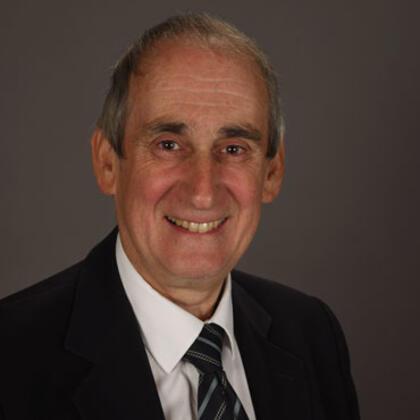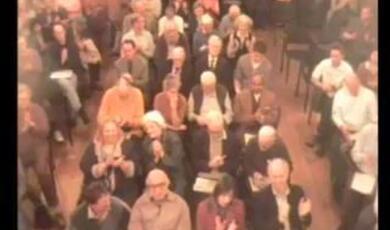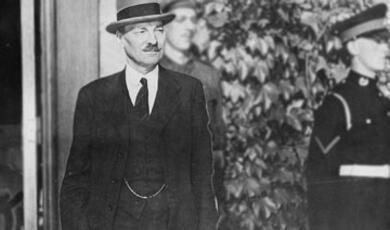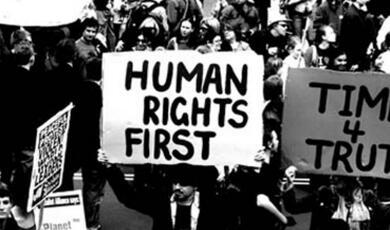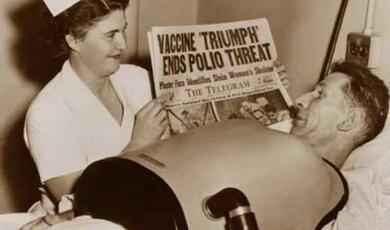Deportation: Some Ins and Outs
Share
- Details
- Text
- Audio
- Downloads
- Extra Reading
Deportation in the modern context.
This is a part of the Crime and Retribution Mondays at One lecture series, which includes the following lectures:
Welcome and introduction by Professor Tim Connell
Crime and compensation in Medieval England, by Professor Anthony Musson
Newgate: London's Prototype of Hell, by Dr Stephen Halliday
Bound for Botany Bay: The trauma of exile, by Dr Alan Brooke
Download Text
26 OCTOBER 2009
Deportation: Some Ins and Outs
Professor Tim Connell
Our series on Crime and Retribution has covered mediaeval forms of compensation, Newgate and the administration of justice (such as it was) in the seventeenth and eighteenth centuries, and last week we heard about transportation and Botany Bay. Today I want to look at deportation, which may be defined as the expulsion of an undesirable alien from a country, or one whose presence is unlawful or prejudicial[i]. Definitions of course, beget further definitions.
'Expulsion' indicates that deportation is taking place against the will (or quite possibly, the wellbeing) of the individual or group concerned. 'Undesirable' does not necessarily mean criminal: Siberia, of course, provided a convenient dumping ground for everyone from the Czars to Stalin. In Soviet Russia, there were mass deportations as well as individual ones, forced movements of large populations, based on a whole range of factors: there were the Kulaks, moved from their smallholdings to make way for collective farms; there were political opponents or people who had fallen foul of the government, ranging from non-Bolsheviks to Trotskyites; ethnic groups, such as the Cossacks, whose loyalty to the regime was called into question; and millions of individuals who quite possibly never knew why they were being sent away.
Most of the people in these examples were Russian citizens. But there is usually emphasis on 'alien', a term which underlines the remote and even unacceptable nature of the people concerned. 'Unlawful', as we shall see, brings in the question of illegal immigrants as opposed to refugees and asylum seekers, who are protected under international law dating back more than fifty years. And that in turn raises the issue of people trafficking, and those who prey on others who may be in the most desperate plight because of war, border disputes, ethnic cleansing, the famine and disease which may result from the mass disorganised movement of people in times of instability. We will almost certainly see a new category of people who are fleeing from natural disasters, such as earthquakes, tsunamis or drought, and global warming may well see the removal of whole populations, ranging from the Ganges Delta to the coast of Norfolk.
'Prejudicial' may indicate criminal wrongdoing, or a threat to the state, something which has come to the fore since 9/11 and the War on Terror. The criminal element is perhaps the easiest to justify, as an offence against hospitality, as a misdemeanour which would not have taken place had the perpetrator not been in this country, or even as a threat against Society, in the form of organised crime, such as the Mafia in New York, or the Chinese Tong and Triad secret societies, which tended to prey on their own people. Then there are the shadowy and ill-defined groups in Britain today, referred to in the British press as the Russian Mafia, or gangs from anywhere ranging from the Balkans to the Baltic. In addition, there is the whole swathe of criminal activity related to the drugs industry, which is international, and that leads into complex strategic questions such as the future of Afghanistan. All this without even mentioning the oddest international crime wave of all - piracy off the coast of Somalia, which has at least given us the welcome spectacle of both the Russian and Chinese navies co-operating with the navies of the West in order to ensure the safety of navigation on the high seas.
Already we can see a certain pattern emerging: at the one level, frightened people, whether individuals, families, clans or ethnic groups, fleeing for their lives, or quite possibly attempting to move to a position of greater safety. At another level, the unprincipled elements, such as the gangmasters of the sort who left the Morecombe Bay cockle pickers to their deaths in 2004.[ii] So we can see that deportation is not necessarily a consequence of committing crime; to add to the woes listed above, the most vulnerable people are then preyed on by their own people, via debt peonage, blackmail, physical intimidation and without any protection of law, as the law does not recognise their situation, and barriers created by language and ethnic identity can make crime prevention an uphill task.
Let's take a few examples. Immigrants, refugees, asylum seekers have always been an unpopular topic, going back to the expulsion of the Jews from England in 1290. Only a few thousand people were involved, and the move (by Edward I) seems to have been aimed to dampen protests about heavy taxation.[iii] The expulsion of both the Jews and the Moors from Spain in 1492 was on an altogether different scale.
The first recognisable group to arrive in England are the Huguenots. The St Bartholomew's Day Massacre takes place in 1572, following which there is an outflow of protestants. They tend to be skilled in crafts such as silverware and weaving, and many of them become prominent in the City.[iv] The Edict of Nantes (1598) allows for religious toleration until 1685, when it is revoked, which leads to a further mass exodus, to the English and Dutch colonies of America as well as South Africa.
The Huguenots, and the French aristocrats who arrive during the Terror, are received quite sympathetically, the former as co-religionaries facing persecution, and the latter as part of the general fear of upheaval on the Continent. However, refugees are seldom welcome, especially if they are driven by political events, or if they are seen as some kind of political threat themselves.
The rapid influx of people from Eastern Europe in the late nineteenth century caused similar reactions to those that we can see today, though it is perhaps ironic that the church built for the Huguenots in Brick Lane was converted into a synagogue for the large Jewish population that was arriving - and in due course it became a mosque as the Jews moved out and the Moslems arrived.
The Sidney Street siege of 1911 is a good example of the rather extreme opinions that the situation in the East End of London provoked at national level. On the right we have the notorious Peter the Painter, Latvian revolutionary Peter Piaktow, said to be the leader of a revolutionary or even criminal gang. After an armed incident in which two policemen were killed and another wounded, the gang was run to earth at number 100 Sidney Street in Stepney. The call went out to the Tower of London for reinforcements, and a squad of Scots Guards arrived, (see the picture on the left) along with Winston Churchill, who was Home Secretary at the time. The field gun he called for was not used in the end, but some of the gangsters were killed, and a number put on trial. None was convicted, and one (Jacob Peters) returned to Russia and later became deputy head of the Cheka, Stalin's feared secret police.[v]
Refugees, asylum seekers, illegal immigrants and deportees have seldom been popular.
There was relatively little support for refugees after the First World War, although a large number of Italians came to the UK for economic reasons. In the 1930s, the two prominent acts of kindness were the so-called Kinder Transport of 1938-1939, which brought Jewish children out of Nazi Germany, where they would doubtless have perished[vi], and the Basque children, evacuated from Bilbao in 1937.[vii]
Britain, of course, was not alone in feeling suspicious of incoming waves of migration, witness the time of the Yellow Peril in America, or the workings of the White Australia Law, which only came to an end in 1973.[viii] This is perhaps ironic, given the extent to which both countries have been built on mass migration, however selective this may have been at times.
Here we have the 'Mother of Exiles', erected by the French Government at the entrance to New York harbour to celebrate the Centenary of the United States of America (though there are those who say that it should now be moved into the middle of the Rio Grande). At the foot of the statue there is a plaque, with a quotation from The New Colossus by Emma Lazarus.
"Give me your tired, your poor,
Your huddled masses yearning to breathe free,
The wretched refuse of your teeming shore.
Send these, the homeless, tempest-tossed to me,
I lift my lamp beside the golden door!"
This sentiment has never stopped each successive wave of immigrants from being unpopular with those who have already arrived and become established, and the sheer numbers involved also give rise to concern as to whether the country, however large, can assimilate.
There are, of course, those who find themselves doubly excluded: countries such as Albania, Ukraine or Moldova as their people are neither refugees nor eligible for entry as members of the EU. But the example of earlier entrants such as Ireland, Portugal and Spain indicates that the EU long-term goal of making the sending countries sufficiently prosperous and attractive to persuade people to stay at home, is basically sound.
These were countries which suffered decades of repression and control and failed to benefit from Post-War reconstruction. The fate of Poland is a case in point. Fought over for centuries by larger neighbouring powers, finding itself in uncertain confederations and alliances with smaller powers, and prey to incursion even by the Turks[ix], Poland is a prime example of a country whose unstable and contentious history has led to mass movement and re-settlement of its population. After the First World War the Curzon Line was drawn up by Lord Curzon 1919, trying to establish a new border forPoland with the Bolsheviks. This subsequently became pivotal in negotiations with Stalin in 1945 as he could then claim that this was the line originally favoured by the British. To mis-quote Chamberlain, these were not far-off countries of which we knew nothing. From the point of view of the other countries in question, there were also times when we knew too much.[x]
Freedom of movement, or rather the lack of it, was a key issue in the aftermath of the Second World War. In contrast to Ernest Bevin's wish ('I want to be able to go to Victoria Station and buy a ticket to go to anywhere I damn well please'), whole populations were restricted, and it is hard now to imagine the massive change on people's lives wrought by the dismantling of the Iron Curtain.Bevin's wish only came true post-1989, and then the starting point was really Stansted with Ryanair, rather than Victoria, or even St Pancras. Such ease of movement was not possible when I was a student, even though I had a summer vacation job shepherding 120 American tourists around Europe to remote, unknown and hazardous destinations such as Czechoslovakia and East Germany. But then in those far-off days the hippy trail took backpackers and hippies in camper vans across Iran and Afghanistan to Kathmandu, something which would only be possible today in an armoured personnel carrier.
A. Push factors
So what drives people out of their own homes? All too often they leave everything they have, arrive with the clothes they stand up in, having lost everything and, in some cases, having incurred heavy debts in order to be able to get out. Upheaval may not only be the direct consequence of a particular event, but may also be the result of the aftermath, with disruption to political stability, economic activity and social structures. In contrast to economic migration, which tends to attract young adults, major calamities extend to whole families, towns and regions.
a) War and turmoil[xi]
We have seen that the world has seldom been at peace and the civilian population has always found itself in the firing line. This was particularly so at world level with the end of the Second World War and the process of de-colonisation which, in some cases, spawned local wars as a consequence, such as Biafra in the 1960s. However, population growth, a greater inter-connectedness brought about by modern means of transport and communication, plus the break-up of former no-go areas for international travel, have led to far more informal movement between countries. In some cases, whole populations are moved across borders, as has happened in the Western Sahara, a little-known point of conflict which has been going on now for thirty years.[xii]
b) Ethnic cleansing
The Cambodia of Pol Pot and his Khmer Rouge gave rise to quite possibly the worst excesses the world had ever seen. In a four-year period in the late 1970s, some two million people were murdered in a pernicious social experiment, the application of an extreme political ideology which was allowed to run riot until neighbouring Vietnam militarily intervened.
The phrase 'ethnic cleansing' first came into common use in the early 1990s as a result of events in the former Yugoslavia. The UN defines it as the planned deliberate removal from a specific territory, of persons of a particular ethnic group, by force or intimidation, in order to render that area ethnically homogenous'. On the ground, in practical terms, it led to the deaths of over 8000 men and boys in Srebenica in 1995.
Rwanda perhaps gave us the most horrifying scenes, with the massacre of largely Tutsi people by the rival Hutus in 1994. Accurate figures, understandably, are hard to compute, but up to a million people may have died in a short period - possibly 20% of the total population.[xiii]
Then there is Congo, whose wars starting in 1998 are thought to have created over five million casualties - the heaviest losses in a single war since World War II.
Currently there is the crisis in Darfur, with an entire population displaced by its own government. The UN did despatch forces, while expressing doubt as to whether the civilian population faced actual genocide. The International Criminal Court appears to have fewer doubts about the situation, since it filed war crime charges against the actual president of Sudan, Omar al-Bashir. As many as half a million people may have died, many as a result of starvation.
c) Religious conflict
From the pogroms and the Holocaust to the modern day, religion has all too often been seen as a motive for conflict, even between co-religionaries.
d) Calamity
Natural disasters are by no means new. Fifteen million people (half the population at the time) may have died in the Bengal famine of 1770, and an estimated 3 million died in the famine of 1943. Earthquakes have struck with some regularity, sometimes in well-regulated areas like Japan, which are usually prepared, sometimes not so much, as in Mexico in 1986. And earthquakes in remote areas, as have occurred recently in both Iran and Pakistan, can cause enormous difficulties for rescue and re-organisation. The word 'tsunami' has now entered the English language as a result of the massive tidal wave of 2004, and we have been reminded of the devastating forces of nature with the smaller and more recent one last September.[xiv] Tsunami refugees are beginning to arrive on higher ground from islands and coastal areas which face further inundation if and when sea levels rise as a result of global warming. (The Maldives government held an underwater cabinet meeting recently to draw attention to the danger.)
In all this, the ones who seem to suffer most are the children, in terms of disrupted family life, missed schooling, lost childhood, health and serious abuse, ranging from human trafficking and slavery, though to forced service as child soldiers, a phenomenon which has become distressingly common. As many as a quarter of a million may be under arms in the world today.[xv]
B. Pull factors
So that gives some idea as to why so many people seem to be on the move today. What draws people to a particular country? There may well be family links via established communities or because of historical connections with a particular country (mainly ex-Empires). New communities can set themselves up in a relatively short time - both the Albanians and Somalis are recent cases in the UK. Language may be a key factor, as with the Latin Americans and Spain, and the culture may be familiar, or at least recognisable via satellite TV, films or even football leagues. The possibility of work may be attractive at both ends of the spectrum, ranging from the highly skilled, such as medical staff or IT engineers, through to the unskilled who are prepared to take on the jobs that no-one else wants. Immigration, of course, may be used as a means of regulating the labour supply, expanding it in the good times, and cracking down when things get tough.
Countries of traditional emigration are having to re-adjust as targets for immigration: Britain, Ireland and Spain are critical cases in point. From the Highland Clearances through to the 'Ten Pound Pom' of the 1950s, it has been normal for people to leave the British Isles in search of a new life. And the oil boom of the 1970s created a new class of economic migrant - all those people who went off to the Gulf States on tax-free contracts.
Both Ireland and Spain historically have suffered from a constant drain of young people and talent, though the undoubted economic success and social development of both countries in recent decades have made the prospect of returning or even staying at home an attractive one, at least until the recent downturn when unemployment is again beginning to run back up towards traditional levels.
Spain, as an ex-Imperial power, has obviously been a key focus for immigration from former colonies, and the similarities in lifestyle, not to mention factors such as language and religion, have made assimilation of large numbers of newcomers fairly easy. However, Morocco (Spain's southern neighbour) and oddly enough, Romania, have also become significant sources of immigrant labour. The Spanish government has gone to the extent of organising amnesties, six since 1990. There are reckoned to be some 4 million immigrants in the population (around 8.4% of the total), and about 700,000 people came forward in the last amnesty, which took place in 2006. The Government argued that it regularised a large number of people, brought them into the tax and national insurance system and extended the protection of employment law to all workers. Critics argued that it led to a rapid influx of illegal workers from other countries who wanted to take advantage of the amnesty, though there were safeguards in place to prevent such abuse. A telling argument in support of controlled migration (which applies increasingly to other Western nations) is that the falling birthrate and increased longevity of the host population is leading to a massive crisis in skills gaps and shortages, not to mention the sustainability of pension funds, and the future ability of a government to maintain up to 40% of the population outside of the wage-earning labour force.
There are still categories of people who for a variety of reasons have a claim to settle in this country. Many of the Jamaicans who arrived on the Empire Windrush were ex-servicemen, many of whom had served in the RAF. And Joanna Lumley's recent campaign in support of the right of vetern Ghurkas to settle here received a great deal of popular support.
Not all the people who come to the UK need a visa or permission to work. The expansion of the EU, especially in recent years, has created a massive influx of fellow Europeans.[xvi]
It may have been advisable to allow for a gradual build-up as some other European countries did. On the other hand, the recent boom may have reflected the availability of labour, and figures seem to suggest that people return home or move on in times of recession, and equally immigration may well be regulated to ensure a constant supply of cheap labour. The Migration Advisory Committee adds and removes categories of skills shortage. Only last week it recommended adding to the list teachers in special schools and meat boners and trimmers.[xvii]
It should be noted too, that there is a two-way factor here. If other people have the freedom to come to this country, that then paves the way for us to go abroad, such as the 250,000 Brits who now live on the Costa del Sol and the increasing number of people who seem to be buying properties in the most unlikely places, if current TV programmes are to be believed.
C. Response and regulation
All of this is a reflection of the changes brought about by the Post-War world, globalisation and an increasing economic inter-dependence between countries. The Lisbon Treaty provides for the freedom of movement and the Schengen Agreement allows for the crossing of borders within the EU. The UK, of course, has opted out of the latter. The Lisbon Treaty was amended in 2007 to update policies on border checks, asylum and immigration. A common policy is called for on asylum and temporary protection to any third-country national requiring international protection, which needs to reflect international law which prohibits the return of individuals to a place where their life or freedom would be threatened. Measures to prevent illegal immigration and trafficking in human beings are envisaged, as well as measure to prevent unauthorised residence, including removal and repatriation. Article 62 preserves the right of member states to determine their own level of admission of third-country nationals to seek work.[xviii] Clearly regulations are needed, but these need to be practical as well as humane. The Sangatte camp at Calais is an example of a situation which appears to have developed without proper control and needs to be avoided.
The deportation process in the UK has come in for a great deal of criticism in recent years. A prime example of this was the announcement that over one thousand foreign prisoners had been released from UK prisons when they should have been considered for deportation. A hasty search for the individuals in question did not meet with a great deal of success, and it also led to the realisation that the Government was not entirely sure as to how many foreign nationals were being held at any one time in UK gaols. The system has doubtless been tightened up,[xix] although there is provision within the Criminal Justice Act 2003 for prisoners to be processed in cases where the judge has not necessarily specified deportation after the sentence has been served. Prisoners from within the European Economic Area should be deported if their sentence was for two years or more, and one year in the case of prisoners from further afield. There does, however, have to be proof that the individuals presents a serious threat, and is likely to commit another serious crime in future.[xx] However, there are safeguards. There is a process of re-documentation, meaning that the receiving country has to be willing to take the person concerned. Then there may be a problem of identifying where the individual is from, especially if their papers were not in order in the first place. And under human rights law (signed as long ago as 1948[xxi]) nobody can be returned to a country where they will be subject to ill treatment, a procedure known as non-refoulement.[xxii]
The UK is drawing on the experience of other countries in attempting to introduce a humane and workable system to control migration. Most recently, the 4-Tier system has been introduced from Australia, though it appears to be more complicated to manage at first sight than had previously been thought. Applicants need to score points on a range of objective criteria, and everyone except for Tier 1 needs a sponsor. There is concern about the time it takes to process applications and the cost (especially for overseas students). And the system is linked to the gradual introduction of identity cards, which many people dislike, though since November 2008 over 90,000 have been issued to foreign nationals.
The UK Border Agency has taken on responsibility for the protection of the UK borders and the management of immigration matters. This has led to episodes reminiscent of Gérard Depardieu and Andy McDowell in Green Card (1990) with complaints of over-zealous immigration officers objecting because a newly-wed couple did not have enough photos of their wedding. In an extension of preventing young women from being forced into marriage, there have also been cases of what appear to be genuine married couples being challenged.
Deportation is not necessarily a response to criminal behaviour. There are also the categories of Deportation with Assurances and Voluntary Assisted Return and Reintegration, and even Administrative Removal, where someone has failed to comply with a condition of entry, who has simply overstayed or who has managed to enter by deception.
Voluntary Assisted Return and Reintegration assists people to return to their country of origin where they have been given exceptional leave to remain, or where they are appealing or have had their appeal turned down. The scheme provides advice, counselling and information about return, including help with obtaining travel documents, the flight home and even a meet and greet service at the other end. A small grant is available for the cost of re-settlement, and there is help in getting work or setting up a small business and getting children back into school.[xxiii]
Deportation with Assurances has been developed to offset concerns and complaints that the person concerned faces imprisonment and torture if they are returned to their country of origin or where their extradition has been requested by another state. Agreements have been reached with a limited number of countries, including Jordan and Libya. However, there are clear concerns here regarding enforceability, and the problem of keeping up with the pace of change in areas of conflict. The Immigration Appellate Tribunal, for example, announced last week that the level of indiscriminate violence in Afghanistan was not enough to prevent the return of failed asylum seekers. The press has reported on the case of a man who was returned to Afghanistan in 2004, and who was shot a year later. That is not a recent example, but illustrative of the care that needs to be taken in such cases, especially where the level of conflict varies across a particular country.[xxiv]
E. Human trafficking and recent news
An item that has recently been in the press is worth touching on. Dennis McShane clashed on Newsnight last week with Jeremy Paxman, following a recent report in the Guardian that figures given with regard to human trafficking and the sex trade were inaccurate. Such a wide range of organisations provide figures for the number of women and even children who are traded against their will for sexual purposes that it seems inconceivable that the Guardian report should be right. Given the clandestine nature of the activity (not to mention its economic value) it will be difficult to get a clear picture of the true numbers involved. However, studies carried out in the sending countries, particularly Eastern Europe and parts of the Far East, indicate that this is indeed a serious problem. The US State Department[xxv] puts forward a worldwide figure for women being trafficked at around three quarters of a million, and the International Labor Organization puts the global annual turnover from the trade at $31 billion.
Clear difficulties arise with regard to the future of women involved in this trade. In many cases, they will be unable to return home, and if they have been held against their will, are unlikely to continue in their present situation. There are, of course, linguistic barriers which will make either studies or police action in this area that much more difficult. But there are initiatives to help these women re-settle and the numbers being reported by the organisations involved would also indicate that the Guardian figures are unrealistic.
F. Conclusion
In conclusion, deportation and the whole question of the proper control of population movement is a contentious one. One the one hand, it is a fluid process, subject to rapid change, and on the other the response of government is constrained by international obligations, the need to co-operate with other countries, and to ensure a proper measure of justice and fairness. And there are constant concerns on the part of the press and the general public, ranging from the cost to the public purse through to fears that the country is filling up. There have been so many problems over government statistics that there seems to be little solid ground on which to make future plans and population forecasts are notoriously hard to predict. The question has to be asked, how much control is politically acceptable? Identity cards seem to be unpopular, partly because of cost, and partly because of distrust as to whether the Government can be trusted with confidential personal data. The Madrid bombers all had valid ID cards and were in Spain legally. And it was a Spanish national who provided the explosives.
Then there are matters of principle which should cause concern, as they raise major ethical issues, such as detention without trial, house arrest, the imprisonment of minors or the introduction of unreasonable levels of surveillance of what is now termed 'domestic extremism'. This could all lead to a cumulative effect of the loss of individual rights and the creation of a society which does not fit in with our traditional views of fairness and tolerance. Demographic changes, including the greying of the population, economic realities such as labour shortages and skills gaps, mean that we may not be able to sustain the UK's working population without drawing in people from abroad. Set against all that is the fear of terrorism, though the threat may come from domestic sources as much as overseas ones. There is no short-term solution and a delicate balance needs to be kept to preserve for the long-term what could, in the short-term, be at risk.
G. Envoi
Let me finish with a surprisingly thoughtful poem by Rudyard Kipling, that arch-Imperialist and High Priest of Empire, the man who gave us 'Take up the White Man's Burden' and 'East is East and West is West', and who was used as a visual inspiration by Warren Mitchell for his characterisation of Alf Garnett. It is entitled We and They.
FATHER, Mother, and Me
Sister and Auntie say
All the people like us are We,
And every one else is They.
And They live over the sea,
While We live over the way,
But - would you believe it? - They look upon We
As only a sort of They !
We eat pork and beef
With cow-horn-handled knives.
They who gobble Their rice off a leaf,
Are horrified out of Their lives;
And They who live up a tree,
And feast on grubs and clay,
(Isn't it scandalous?) look upon We
As a simply disgusting They!
We shoot birds with a gun.
They stick lions with spears.
Their full-dress is un-.
We dress up to Our ears.
They like Their friends for tea.
We like Our friends to stay;
And, after all that, They look upon We
As an utterly ignorant They!
We eat kitcheny food.
We have doors that latch.
They drink milk or blood,
Under an open thatch.
We have Doctors to fee.
They have Wizards to pay.
And (impudent heathen!) They look upon We
As a quite impossible They!
All good people agree,
And all good people say,
All nice people, like Us, are We
And everyone else is They:
But if you cross over the sea,
Instead of over the way,
You may end by (think of it!) looking on We
As only a sort of They ![xxvi]
Now, if he could see it then, in a city where three hundred languages are spoken, where you have people from every corner of the globe, where everything from the NHS to the London Underground would grind to a halt without foreign labour, perhaps you can see it too...
________________________________________
[i] Merriam-Webster Dictionary.
[ii] 21 people drowned that night in Morecombe Bay, mainly illegal immigrants. http://www.timesonline.co.uk/tol/news/uk/article568606.ece#
[iii] The Jews returned to England gradually after 1655. The Bevis Marks Synagogue in the City was opened in 1701. It was actually built by Joseph Avis - who was a Quaker. http://www.sandp.org/history.htm
[iv] Many also go to the Americas, including the ancestors of Davy Crockett, Paul Revere and Alexander Hamilton, one of the Founding Fathers. http://en.allexperts.com/e/h/hu/huguenot.htm
[v] Peters was eventually liquidated by Stalin in 1938. http://en.wikipedia.org/wiki/Siege_of_Sidney_Street See also http://www.met.police.uk/history/sidney_street.htm
[vi] The children arrived mainly at Liverpool Street station, where a statue was unveiled in 2003. http://www.ajr.org.uk/documents/ktnov03.pdf. Some 10,000 children were saved. See http://www.kindertransport.org/history.htm
[vii] http://www.basquechildren.org/
[viii] http://www.knowledgerush.com/kr/encyclopedia/White_Australia_policy/
[ix] For details of the Polish-Ottoman War (1620-1621) see http://www.historyofwar.org/articles/wars_polish_ottoman_1620.html There was a further conflict between 1672 and 1676, in which Poland lost control of large parts of the Ukraine.
[x] http://www.britannica.com/EBchecked/topic/147270/Curzon-Line
[xi] These pictures were taken by the American photographer Susan Meiselas.
[xii] See the BBC for a very succinct account: http://news.bbc.co.uk/1/hi/world/africa/country_profiles/3466917.stm
[xiii] Go on to Google Images for a set of absolutely ghastly pictures taken after the massacres.
[xiv] For a remarkable piece of footage involving an unfortunate surfer, see http://www.youtube.com/watch?v=AlPqL7IUT6M
[xv] Figures from Amnesty USA. http://www.amnestyusa.org/children/child-soldiers/page.do?id=1051047#
[xvi] London now,has the sixth largest population of French of any city, with a Gallic population of around 250,000.
[xvii] http://www.bia.homeoffice.gov.uk/sitecontent/newsarticles/2009/october/24-mac-sol-additions
[xviii] Lisbon Treaty (as amended 2007) Chapter 2, Articles 62 and 63.
[xix] Some 4000 prisoners were deported in 2007.
[xx] These decisions are made by the UK Border Agency. http://www.bia.homeoffice.gov.uk/
[xxi] http://www.udhr.org/udhr/default.htm . The United Nations High Commission for Refugees website contains useful information about particular cases. Refworld is a useful journal to consult at http://www.unhcr.org/refworld/volrep.html Aid workers keep up-top-date by reference to www.alertnet.org (set up by Reuters journalists after Rwanda). It is run by Thomson Reuters Foundation. See also www.relief.web.int
[xxii] http://news.bbc.co.uk/1/hi/uk/4939376.stm
[xxiii] http://www.refugeecouncil.org.uk/howwehelp/directly/voluntary_returns/programmes.htm
[xxv] http://en.wikipedia.org/wiki/Human_trafficking
[xxvi] This is the Envoi to 'A Friend of the Family' in Debits and Credits. The story is actually about an Australian.
This event was on Mon, 26 Oct 2009
Support Gresham
Gresham College has offered an outstanding education to the public free of charge for over 400 years. Today, Gresham College plays an important role in fostering a love of learning and a greater understanding of ourselves and the world around us. Your donation will help to widen our reach and to broaden our audience, allowing more people to benefit from a high-quality education from some of the brightest minds.


 Login
Login



